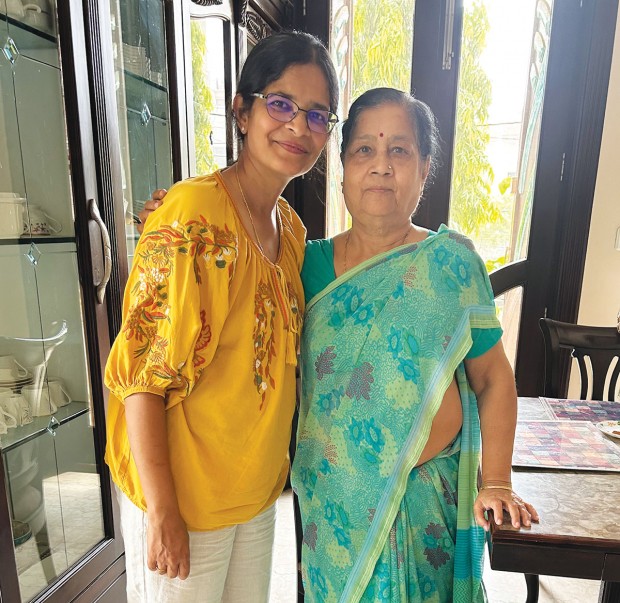Aunties of India
Sugar and spice and everything nice

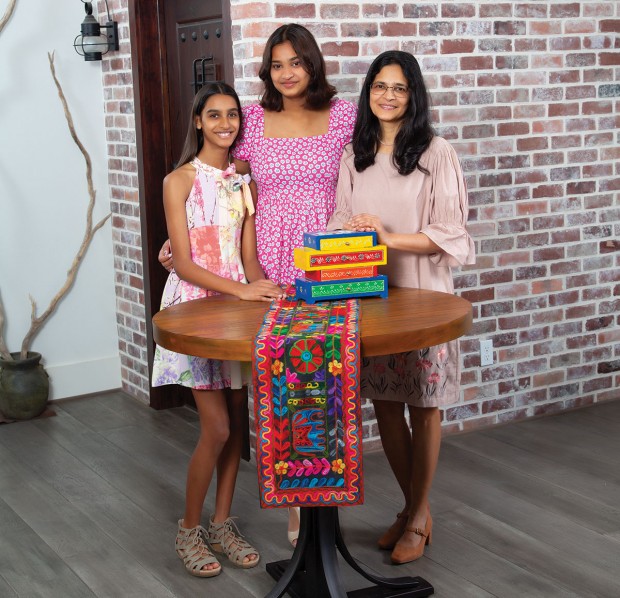
TRIP KEEPSAKES Chinni, Ninni, and their mother Suparna love the vibrant colors of India, displayed here in a few mementos from their July 2023 trip: a colorful table runner and a trinket box Suparna received as a gift. (Photo: lawellphoto.com)
To Suparna Vashisht, it was the magic hour. When the sky morphed from charcoal to a soft dove gray, hints of blue peeking through. Birds, deep in conversation, greeted the dawn. And so did she as a barefoot teen in a guava tree, munching its fruit as soft, golden light woke up the land.
“I was usually the first one up and out,” says Suparna, 52, of life with five siblings on her family’s farm outside of Hyderabad in southern India. She’d scamper up one of the orchard trees, pluck a ripe jewel, and watch the sunrise.
“Sometimes, I’d finish off a lot of the fruit. Early bird catches the worm.”
Suparna’s love of botany is rooted at the farm. The T.H. Rogers assistant principal, mother to daughters, Ninni, 19, and Chinni, 13, still prefers her hands in the soil.
Kale, onions, cilantro, parsley, basil, tomatoes, potatoes, squash, okra…When bounty in her Braes Heights backyard garden surpasses her family’s belly intake, the former math teacher shuttles vegetables to school.
“And I’ve never given students things like candy,” Suparna says. “I bring them seeds.”
She has lived in Houston with her husband, a cancer researcher, since the age of 28, both daughters born here. But her native India – with its flavors, colors, and culture – inspires her life’s playbook. And certain women there are its spine.
It was time to see them again.
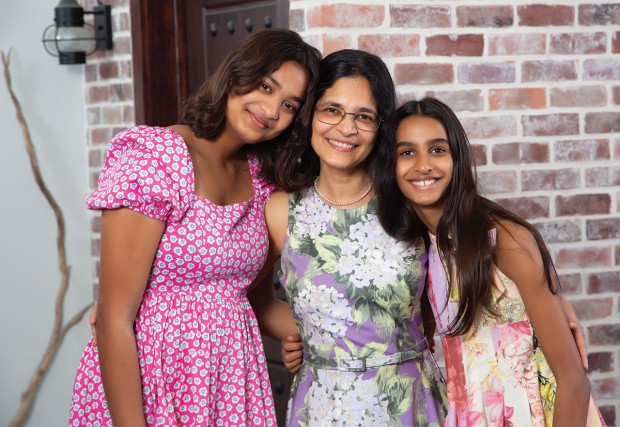
A REJUVENATING TRIP Suparna (at center) and her daughters (from left) Ninni and Chinni traveled to India last July to spend time with Supana’s “aunties” who raised her. (Photo: lawellphoto.com)
“My husband’s dad passed away in 2021, and it made me think about people who are getting much older. I told him, ‘I don’t want to wait and visit India because my aunts are getting older. I want our kids to spend time with them, to know these women who are so important to me,’” she says of her “aunties,” an affectionate term she uses for several women, whether technically an aunt or not.
So, she and her daughters made the 8900-mile trip last July, visiting her homeland of bustling bazaars, beautiful temples, palaces, and car horns, traveling to Jaipur, Delhi and Suparna’s hometown, Hyderabad.
They visited India’s number one attraction, the Taj Mahal, albeit on a relentlessly hot day that made them all miserable. Houston heat? What Houston heat?
They rode an elephant up cobbled stone to Amer Palace, famous for its gates, large ramparts, and sandstone and marble fort, built in 1592, overlooking the jagged hills of Jaipur.
And they made the rounds to her aunties, reminiscing, laughing, and eating. Then eating some more. Stories flying. Nostalgia on overdrive. Ninni and Chinni hovered over cooktops as aunties assembled recipes Suparna loved as a child. The sisters devoured the food and the culture, so dear to their mom.
And they watched her recharge.
“I am so happy there,” says Suparna, who lost both parents to illness, just years apart, when she was in her 20s. “When I go to India, I always feel rejuvenated. When I returned from this trip with my daughters, I came back even more so. Two weeks of time I spend with family in India takes me through the year.”
Suparna has made five trips over the years while Ninni and Chinni have made four and three visits, respectively.
This time was different, says Ninni, a biomedical science major at Texas A&M University. “We were visiting her family. Normally we go see Dad’s family and one or two of her siblings. But this time we got to see more of her side, people she grew up around. That was nice for her. They are where she gets a lot of her morals from.”
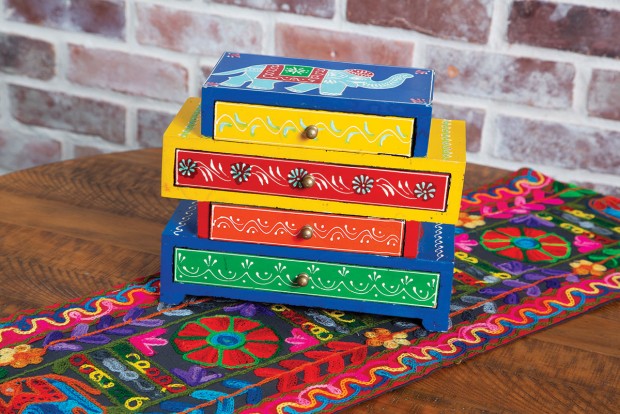
This colorful box from India is indicative of the vibrant colors in Suparna’s home. (Photo: lawellphoto.com)
Suparna, pictures at the ready, discussed the trip recently, explaining the traits that make each aunt special.
“Let’s start with my mom’s sister-in-law,” she says of Saroj, 85, from Jaipur, the aunt of “smiles and joy.”
It had been 20 years since she’d seen Saroj, who now has Parkinson’s disease. “I have never seen that aunt without a smile on her face,” Suparna says. “She still cuddles me like I’m a young teenage girl. We both soaked up that experience, being around each other again. It was a bit emotional.”
Ninni and Chinni made jalebi with Saroj’s daughter, a funnel-cake-like treat made by piping spirals of slightly fermented batter into hot oil, then soaking the whorls in warm sugar syrup. “It was fun!” pipes up Chinni, a seventh grader at T.H. Rogers. “And delicious.”
Suparna recalls a scene at Saroj’s house decades ago. “My cousin had a tray with teacups to serve everyone, and she dropped it. China shattered everywhere. My cousin was horrified, I was horrified! But Saroj was like, ‘Oh, that’s okay, let’s just clean it.’ She taught me that it’s okay for accidents to happen. It’s a healthy approach.”
Suparna finds that this personality trait comes in handy when life starts to rattle like a bum wheel on a shopping cart. Like during Houston flooding.
The Memorial Day flood of 2015 was Suparna’s first experience with rising waters. The family escaped across the street to a neighbor’s house, Chinni on her dad’s shoulders. They navigated chest-deep water, wearing life vests with walking sticks, Ninni with their bearded dragon Lady Jane on her head.
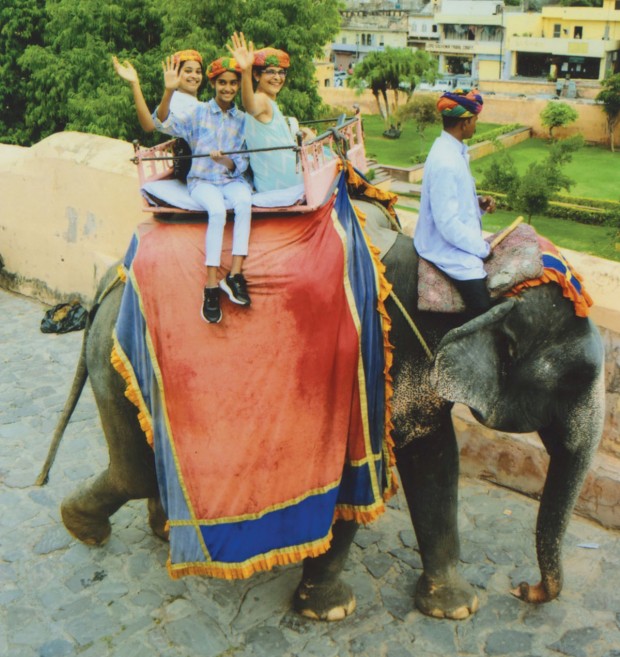
Suparna, Chinni and Ninni rode an elephant up cobbled stone to Amer Palace, famous for its gates, large ramparts, and sandstone and marble fort, overlooking the hills of Jaipur.
“You have to keep a cool head,” says Suparna, whose home flooded twice more, in 2016, and during 2017’s Hurricane Harvey before their house was demolished and rebuilt higher.
“My neighbors said that throughout, all the way through demolition and construction, every time they saw me, I had a smile on my face. I didn’t realize that, but I just keep going.”
Just as Saroj taught her, Suparna says, “I keep calm and carry on.”
Suparna and her daughters also paid a visit to Manju Deshpande, 69, of Delhi, one of her father’s sisters, “the aunt of lessons and values.” Suparna loves her storytelling and her ability to impart wisdom without being preachy.
“Manju always gives credit to the person she herself learned the lesson from,” explains Suparna. “She told me if you have a smile on your face and explain to someone what the value is from the lesson, they are more than likely to follow it. I’ve used her example all my life.”
Manju is also an expert cook. Chinni helped her make aloo paratha, a tortilla stuffed with potatoes. They scarfed it down.
Next up, Aunt Indu Kamdar, 77, of Hyderabad, another of Suparna’s father’s sisters. “She was always nourishing, but in a firm, yet gentle way,” recalls Suparna of her aunt’s no-nonsense energy. “I spent a lot of time with her just after I married. She took me and my daughters out shopping and out to eat, and she told me ‘Your kids are so sweet, and they adapt to everything. They don’t say no to anything or make demands.’ I took that as a very nice compliment. She says what she thinks and that was very nice to hear.”
Suparna received her undergraduate degree in biology at Nizam College in Hyderabad, years she looks back on fondly. Part of that fondness is reserved for Usha Manik Rao, 75, mother to one of her best college friends. She spent hours at Usha’s house during those years, lapping up her lentil soup. Their bond endures to this day.
“We visited her this trip, and we had potluck so she wouldn’t have to cook,” Suparna says. “And her husband is so sweet. He took my daughters out for ice cream.”
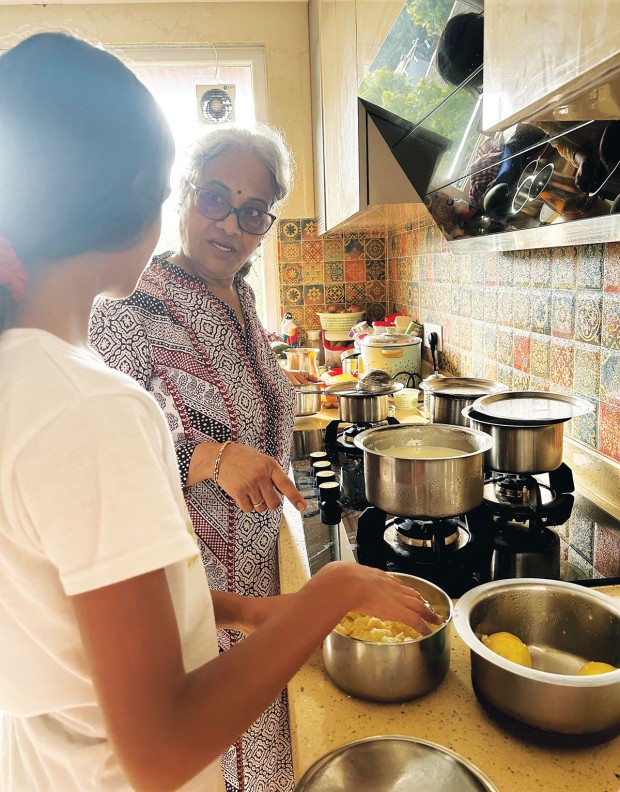
Chinni learned to cook aloo paratha, a potato-stuffed tortilla, with Suparna’s aunt Manju Deshpande at her Delhi home.
“They have guava ice cream there,” says Chinni. “There’s this one specific shop there that had guava ice cream with spices on it. I would have gone there every day if I could!”
Suparna and her husband take turns visiting his widowed mother, who has been ill and bedridden. This trip was particularly special because their daughters had quality time with the 86-year-old, creating memories like keepsakes.
“She taught and was a principal in Hyderabad at a government school for years,” Suparna explains. “She was the first woman I ever knew who worked outside of the home. She welcomed me wholeheartedly into the family and taught me what it’s like to balance those portions of your life – being a working woman and tending to the home.”
Ninni and Chinni might still be recovering from one aunt they visited. Suparna’s aunt Kamal, wife to her dad’s cousin, knows no end to hospitality. “You almost feel force-fed,” jokes Suparna of the 90-year-old who kept the food and candy flowing. In trip pictures, they look nearly comatose, sleeping after the feeding frenzy.
“We ate sooo much!” says Chinni.
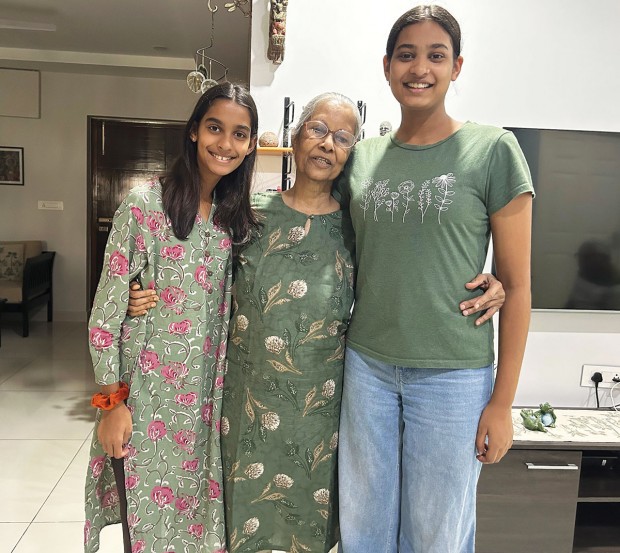
Indu Kamdar, a sister of Suparna’s father, embraces Chinni (left) and Ninni (right) at her Hyderabad home.
Kamal remembered Suparna’s favorite dessert: puran-poli, a tortilla filled with molasses and chickpeas, a party for the taste buds. Kamal insisted relatives order it the night before Suparna’s arrival.
“I was so touched that she remembered what I liked after so many years. The girls just loved her.”
As a child, Suparna thought her strict, but she now realizes that Kamal, widowed, had to be strong, structured, and disciplined because she was raising three boys by herself. “She had a big job on her shoulders. I admire her so much.”
Seeing all these wise women, staples in her life, jogs rich childhood memories. Little wonder she admires her aunts so much. Her Mom and Dad were much like them. Centered, grounded, strong, Suparna says.
“My parents never had an ego about what they had,” she says of her dad’s successful transportation business. “They were so down to earth, and they taught us that no chore is menial. No one is below someone else. I tell my kids: lead a humble life.”
Suparna’s parents led by example. They invited several hundred of her father’s employees and their families to the farm each year, treating them like kings and queens. “We had a huge meal for them, and our family would serve them. We ate last,” Suparna says of the teachable experience.
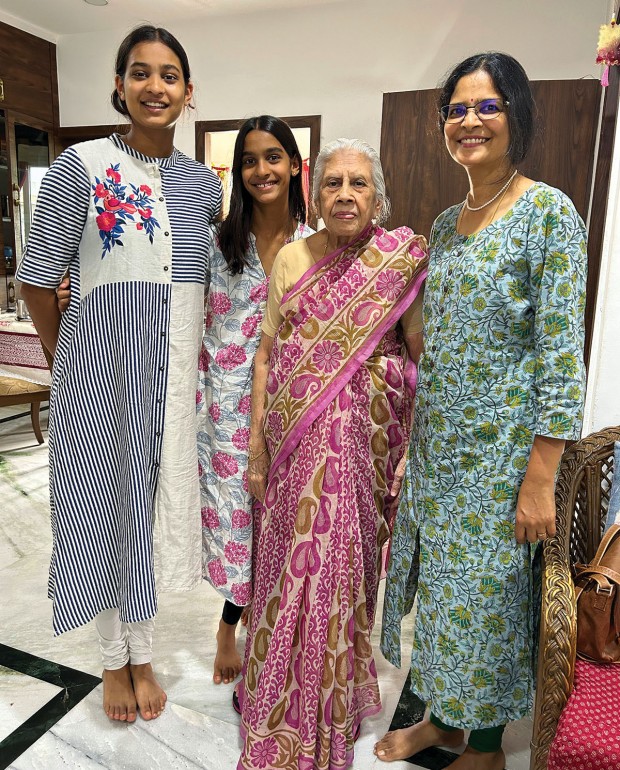
Food and memories were flowing at Suparna’s aunt Kamal’s house in Hyderabad. Pictured from left are Ninni, Chinni, Kamal, and Suparna.
“We had helpers at the farm, but my mom never relied solely on others to do the work,” she recalls of the hand-harvested, chemical-free farm. “She taught us. She made sure we knew how to do everything. And I was always going to my aunts’ houses, helping them with whatever they needed. They taught me things, too, and we spent a lot of time together when I was growing up. My dad’s sisters would visit during the summer with family. Counting me and my siblings, plus their children, that was a lot of kids at our house!”
Suparna flitted about the farm’s trails barefoot with her siblings and cousins, like a butterfly high on nectar. And yes, India has snakes. Lots of them.
“One day, I screamed bloody murder in our dining room because I saw a huge snake. I climbed up on the table, just screaming and screaming until someone working in the garden came in and smashed it.”
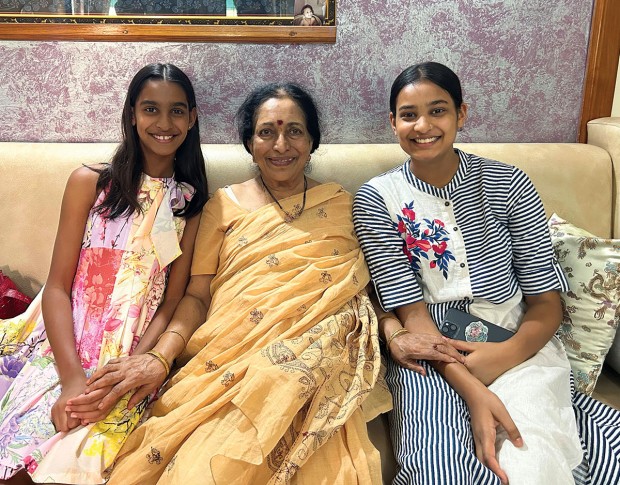
Usha Manik Rao enjoyed spending time with Suparna’s daughters, Chinni (left) and Ninni (right) at her Hyderabad home. Suparna went to Nizam College with Usha’s daughter.
She felt badly that it turned out to be an innocent rat snake, not poisonous. So, she bought a book to identify venomous from non-venomous species. She studied it as if prepping for a test. And never hollered about a rat snake again. She did, however, spot a cobra once, from six feet away, and backed off slowly, taking her barefoot romp another direction.
Those childhood snapshots haven’t faded. Suparna’s memories are as rich as the farm’s red, loamy soil. And thanks to a strong crop of women, her aunties, she always feels connected to her native India.
“I think they make me who I am through the lessons they taught me. I carry them with me, always, no matter the miles between us,” she says. “For my daughters to spend time with them, that means so much to me.”
Want more buzz like this? Sign up for our Morning Buzz emails.
To leave a comment, please log in or create an account with The Buzz Magazines, Disqus, Facebook, or Twitter. Or you may post as a guest.


